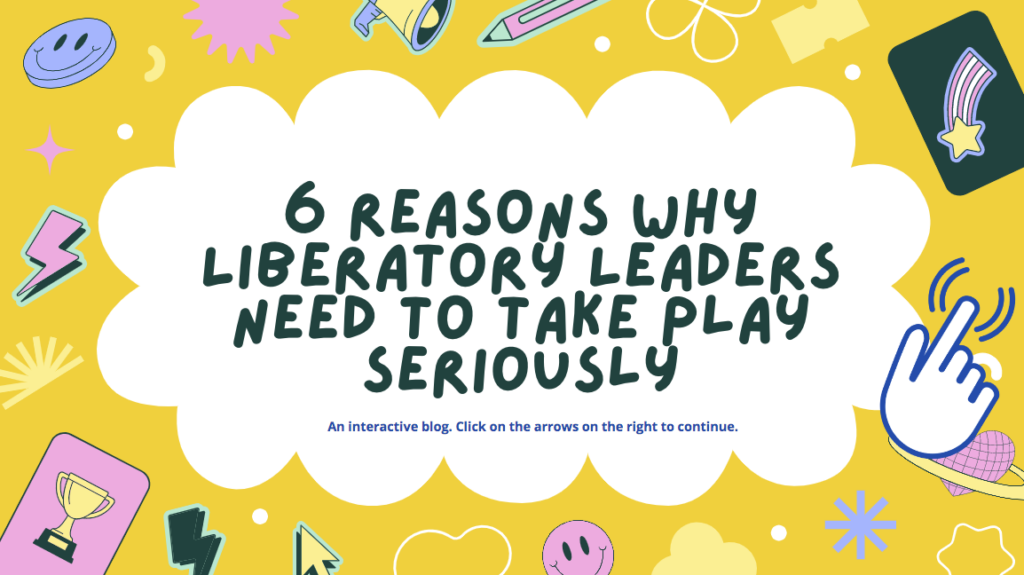
When was the last time you played, did something just because it was fun and felt good? Did you finish feeling enlivened, relaxed, energized, or something similar? Leadership Learning Community has been exploring the roles of fun and play in our activities. This exploration didn’t start out super intentional, but rather as a reaction to the pandopalypse we’ve all been living in. Over time LLC began discussing play in relation to our work, referring to aspects of our work as “playful” or describing meetings and convenings as “play spaces.” For us, this isn’t a cutesy communications strategy. As LLC began to turn our attention to play, we realized that play, when grounded in collective purpose and steeped in values, can be a liberatory act.
Here are six reasons why we believe play can help leaders embrace liberatory practice.
Fuel Ideation
-
- Play can be described as “something that’s imaginative, self-directed, intrinsically motivated and guided by rules that leave room for creativity.” By creating space for creativity and imagination, play helps to quiet the self-conscious, judgemental inner critic. This voice discourages deviations from the known norm and makes trying on new things feel too risky. Without that voice, perhaps there is room for a little bit of magic to invite in new possibilities. Taking a playful stance allows us to adopt a child-like or beginner’s mind, and helps us to develop mental plasticity and adaptability while simultaneously reminding us that our options aren’t all pre-determined and that there is space for the not yet known. This opening of possibility is critical as liberatory transformative efforts are dreaming and imagining into being something that does not currently exist. To do that, we have to stretch our imagination muscles.
-
- Practice: Start the meeting with a playful check-in question like, “If you could go back in time (or to the future), who would you want to meet?” or pick a favorite zoom filter to start the meeting with. Check out more of our check-in questions here.
Nurture, Healing & Wellness
-
- Play is an effective way to manage stress and can be a tool of both self and collective care. Play helps us to be in the moment, similar to meditation. In contrast to oppressive practices, which are confining and restrictive, sapping our spiritual and figurative energy; the enlivening nature of playful activities may help to heal these wounds.
-
- Practice: Host meetings near a park, the ocean, or in nature. Take a walk. Find new analogies for the work we do.
Create New Models of Strategic Thinking
-
- Playing makes things real, during play we don’t just imitate we also imagine and embody (something). Trying on liberation in play spaces/playful ways allows us to feel the benefit of liberation in the moment while we are learning more than we currently know. This focus on liberation now means that during play liberation doesn’t just have to be a future goal. In addition, some studies suggest that play supports memory and thinking skills, so play may literally help us think our way to freedom.
-
- Practice: Do some creative writing. Some of us have and are taking a writing course with Dara Joyce Lurie. She shares a quote from Edward de Bono, “Rightness is what matters in vertical thinking. Richness is what matters in lateral thinking. Vertical thinking selects a pathway by excluding other pathways. Lateral thinking does not select but seeks to open up other pathways. With lateral thinking one generates as many alternative approaches as one can. With vertical thinking one is trying to select the best approach, but with lateral thinking one is generating different approaches for the sake of generating them.”
Expand Leadership Opportunities
-
- Because play utilizes “creative rules” that are distinct from the rules and restrictions of regular life, in play, there exists the opportunity, though not the requirement, to separate capacity from expertise. All of a sudden, players “can” do things even if they aren’t experts at said activity. So you can play at being a pilot without actually knowing how to fly a plane. In playful spaces more people can function as leaders, meaning more people can be actively involved in imagining liberatory practice into being.
-
- Practice: Acting and improvisation exercises like “Questions Only” where you act out a scene given to you with only questions.
Build Community:
-
- Play offers us the opportunity to connect. When we create safe play spaces there is little risk to engaging. People can show up with a less performative stance. BIPOC leaders frequently find themselves under a spotlight or a microscope. The labor of being forced to code-switch or deal with being othered is exhausting so I imagine that BIPOC leaders especially are eager for safe spaces to be themselves. Where showing up as one’s whole self is an invitation and a demand, and for the purpose of supporting the BIPOC leader not to be of utility to others. Often BIPOC leaders are told to show up as their full self because observing BIPOC leaders is good for an observer, not for the benefit of the BIPOC leader.
-
- Practice: Shorten the strategic side of the meeting, and incorporate the karaoke, fun, and games as part of the meeting, not just extra at the end.
An Invitation to Wholeness:
-
- By allowing us to focus on pleasure and fun rather than objectives and outputs, play encourages us to be more than what we can produce. Perhaps play is akin to rest in that way, and maybe we can view embracing the revolutionary possibility of play in the same way that we have begun to respect how rest can be resistance. This need for play spaces may prove to be especially important for BIPOC leaders given that kids of color are often adultified early, and deprived of the space to play freely. By recapturing play, as we have attempted to reclaim rest, we may enliven our work and find new paths toward liberation.
-
- Practice: Make space for play at every meeting whether it’s a check-in, the location, the activities, or the bonding event. Make play and joy part of your community agreements so they show up intentionally during your work.

Ericka Stallings is the Co-Executive Director of the Leadership Learning Community (LLC) a learning network of people who run, fund and study leadership development. LLC challenges traditional thinking about leadership and supports the development of models that are more inclusive, networked and collective. Prior to LLC, Ericka was the Deputy Director for Capacity Building and Strategic Initiatives at the Association for Neighborhood and Housing Development (ANHD), supporting organizing and advocacy and leading ANHD’s community organizing capacity building work.

Nikki Dinh is the daughter of boat people refugees who instilled in her the importance of being in community. Though she grew up in a California county that was founded by the KKK, her family’s home was in an immigrant enclave. Her neighborhood taught her about resistance, resilience, joy and love.
originally published at Leadership Learning Community
Network Weaver is dedicated to offering free content to all – in support of equity, justice and transformation for all.
We appreciate your support!
donate in the box above or click here
Related Posts
November 4, 2024
Receiving Love and Care: A Liberatory Practice
June 21, 2024



